马非隐喻
A Horse Is Not a Metaphor
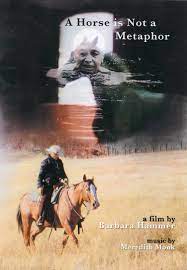
导演|芭芭拉·汉默
编剧|芭芭拉·汉默
主演|芭芭拉·汉默
制片人|芭芭拉·汉默
摄影|芭芭拉·汉默、芭芭拉·克鲁蒂尼斯、弗洛丽·伯克、克里斯·夏沃、朱利安·鲁宾斯坦
类型|短片
时长|30分钟
完成时间|2009
对白语言|英语
字幕|无
地区|美国
制片公司|无
故事梗概
作为一名癌症“健儿”而不是“幸存者”,芭芭拉·哈默 (Barbara Hammer) 乘风破浪,爬着艺术家乔治亚·奥基夫新墨西哥州幽灵牧场的红山、怀俄明州大角的青草山麓,以及纽约伍德斯托克的绿树成荫的小路,将疾病转变为康复。
梅雷迪思·蒙克 (Meredith Monk) 令人难以忘怀的美妙音乐在这部电影中强调和赞扬,在我们可能最沮丧的时候让我们振作起来。
导演介绍
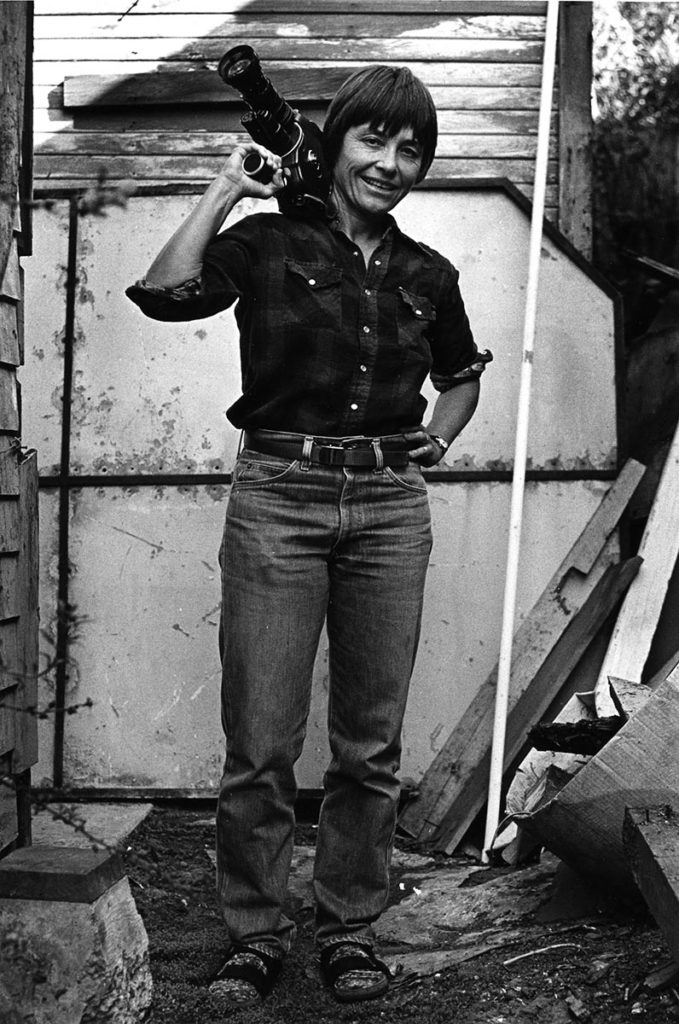
小时候,芭芭拉·汉默想活一个不辜负自己汉默(Hammer,锤子)这个名字的人生。作为1970年代的成人,她实现了自己的愿望:在她称之为“女权主义理想和女同性恋跳床的辉煌时期的十年中”,汉默惊人的一锤之音在多部赞扬并发现自己的女人的性特质(female sexuality)开创性电影中响起。接下来的四十年里,汉默创作了一百多部关于广泛不同主题的电影,她于三月 十六日在纽约去世,享年七十九岁。 汉默三十一年的伴侣弗洛里·伯克证实了汉默死于子宫内膜样卵巢癌。
导演阐述
自由即运动,自由即安逸;自由是一匹马,鬃毛和尾巴在风中飞舞。自由是我的眼睛和思想通过运动跟随表达的流动。自由就是骑着我的马踏上探索未知的小径,或者用癌症重生后的眼睛看世界,随着世界再次焕然一新。我正在完成一部电影,它展示了活在当下最充分和最自由地力量。
在我七岁时,在我六十七岁时,我的愿望都是一样的。我想要的只是我后院里有一匹马。年轻的时候,我真的相信我会在生日那天早上醒来,发现一匹拴着的马在吃着草坪上的草等着我。令人惊讶的是,我现在也会在生日当天去看一眼。也许这是我的天真,但更可能是让这个梦想一直存在的希望感。这种同样的期望和梦想的能力让我在严格的四个半月的化疗中保持希望,尽管其中一半时间是在床上度过的。当我做着日复一日恢复肌肉并通过越来越长的步行和远足时,我知道一切都是为了到时候我可以把腿摆到马鞍上,拍拍马的脖子,让她带我走上招手的小径做的准备。
这个梦想在今年夏天和秋天实现了。虽然我在后院没有发现一匹马,但我确实发现很多人慷慨地让我骑他们的马。我在纽约伍德斯托克的卡茨基尔山脉骑马并拍摄,为在新墨西哥州乔治亚·奥基夫的幽灵牧场和怀俄明州的雷德雷夫特牧场的大角山骑马做准备。美丽和奇迹不是用来表达我在高高的沙漠上漫步、攀登早雪覆盖的红色小山、或在山麓干枯的秋草中漫步时所感受到的兴奋和广阔的词语。无论我骑到哪里,我都带着我的摄像机,从马背上拍摄,我能够记录下充满希望的充满活力和多样性的风景。
当我接受大剂量的化疗时-治疗卵巢癌的推荐方法,我从来没觉得我想活着可以再拍一部电影。尽管如此,我并没有反对我二十年来的挚爱伴侣拍摄静像和录像。当一位旧金山的朋友和电影制片人飞过来带我去乡下休息一周的时候,我并不反对她在卡特里克河游泳时拍摄我的秃头和瘦骨嶙峋的身体。最后,在我自己的病床上,我确实用相机拍摄了滴进我身体内的一袋一袋的化学品、在场护士以及我自己肿胀的脸。在整个住院期间,我用马的形象作为冥想,将我带出病房,带到一个没有边界的地方。
实验电影最能传达癌症患者的情绪起伏。通过并置、剪辑节奏、图像超级渲染和个人观点,可以描绘出多层次的情感、体验、视觉和眼泪,这些都是实验电影的一些特征。传统的记录片方式会减弱情感冲击,无法传达我所经历的考验和希望的激动。
卵巢癌3期不容易诊断,并且两年内复发的几率为70%。如果女同性恋者没有孩子,并且由于持续的恐同医学职业而很少进行妇科检查,那么她们患这种疾病的风险就会增加。这也是一种很难在转移前发现的疾病。作为一名患有癌症的女同性恋者,我想向观众介绍我艰难的医学诊断,让他们更加有防范意识,以及我们大家都能分享的积极的希望态度。
“幸存者”在我看来从来都不是一个适合癌症患者的词。我会选择一个代表繁荣、幸福感、崇高和热爱生活的词。马不是一个隐喻,而是一个活生生的、能呼吸的、充满力量和自豪感的生物,我与它一刻一刻地生活在一起。让我能够分享给其他面临着和我同样生活挑战的人,并让我得以展出这部电影。
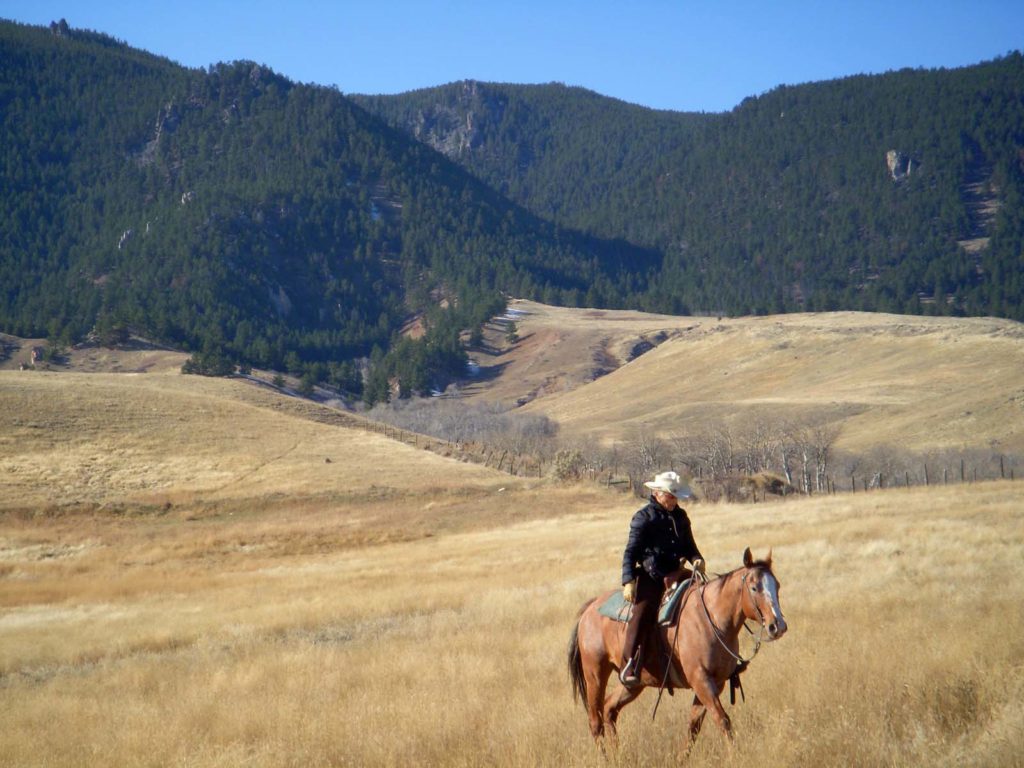
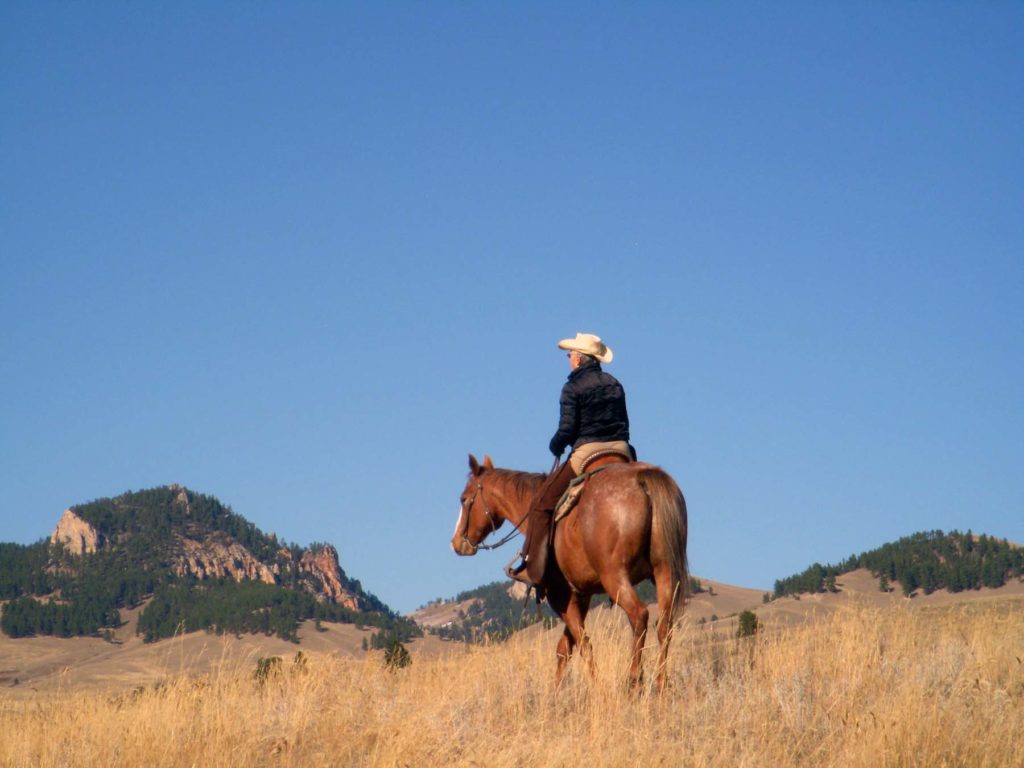
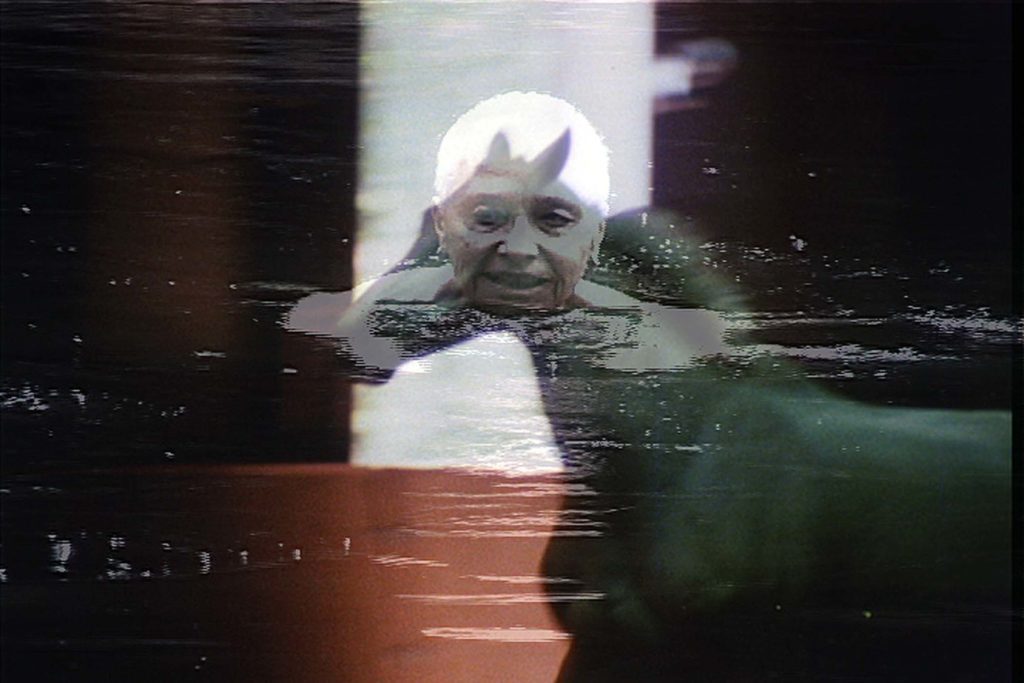
Director|Barbara Hammer
Screenwriter|Barbara Hammer
Cast|Barbara Hammer
Producer|Barbara Hammer
Cinematographer|Barbara Hammer, Barbara Klutinis, Florrie Burke, Chris Schiavo, Julian Rubenstein
Genre|Short Film
Length|30 min
Year|2009
Dialogue|English
Subtitles|None
Region|United States
Production Company|None
Synopsis
As a cancer ‘thriver’ rather than ‘survivor’, Barbara Hammer beats against the odds. She climbs the red hills of Georgia O’Keefe’s Ghost Ranch in New Mexico, the grassy foothills of the Big Horn in Wyoming, and leafy paths in Woodstock, New York, beating her illness.
The haunting and wondrous music of Meredith Monk underscores and celebrates in this film that lifts us up when we might be most discouraged.
Director Biography
As a child, Barbara Hammer always wanted to live up to her name. As an adult in the 1970s, she got her wish: her striking voice rang out in groundbreaking films that celebrated female sexuality just as she was discovering her own, during the decade she called “that glorious time of feminist ideals and lesbian bed-hopping.” Hammer, who created more than 100 films on widely diverse topics over the next 40 years, died in New York, March 16th at age 79. Hammer’s partner of 31 years, Florrie Burke, confirmed Hammer died from endometrioid ovarian cancer.
Director’s Statement
Freedom is movement, freedom is ease; freedom is a horse galloping with its mane and tail flying in the wind. Freedom is my eye and mind following the flow of expression through movement. Freedom is riding my horse on a trail exploring the unknown or seeing with the eyes that cancer has given me, as the world becomes new again. I am completing a film that shows the power of living in the present to the fullest and with the greatest freedom.
When I was seven and when I was sixty-seven, my desire was the same. All I wanted was a horse in my backyard. I truly believed as a youngster that I would wake up one morning on my birthday and find a horse there, eating grass on the lawn and waiting for me. To my surprise, I still hope for a horse on my birthday. Perhaps it is my naiveté but more likely it is a persistent sense of hope that keeps this dream alive. The same ability to hope and dream kept me alive throughout the rigorous four and a half months of chemotherapy even though half of that time was spent in bed. As I built my muscles back day by day by taking longer and longer walks and hikes, I knew I was preparing for the day when I could swing my legs into the saddle, pat my horse on her neck, and ask her to carry me onto the beckoning trail.
My dream came true for me this summer and fall. Although I did not find a horse in my backyard, I did find many people who generously let me ride their horses. I rode and filmed in the Catskill Mountains of Woodstock, and in New York in preparation for the rides in New Mexico at Georgia O’Keefe’s Ghost Ranch and in the Big Horn Mountains at Red Reflet Ranch in Wyoming. Beauty and wonder are not the words to capture the thrill and vastness I felt loping the high desert, climbing the red hills covered by innocent snow, or loping through the dry fall grasses of the foothills. Wherever I rode I took my video camera with and filmed from the horseback, I was able to record the vibrancy and variety of landscape that filled me with hope.
When I was undergoing extensive chemotherapy, the recommended procedure for ovarian cancer, I never thought I could or would want to make another film. Still, I didn’t give up on photography and filming, my loving partner of 20 years. When a friend and filmmaker flew from San Francisco to take me to the countryside for a week of retreat, I did not protest to her shooting my bald head and skinny body as I swam in the river. Eventually from my own bed in the hospital, I did use my camera to film the huge bags of chemicals dripping into me, the nurse at present, and my puffy face. Throughout the time, I used horse as a meditation image to take me out of the confines of the hospital room and to a landscape that has no boundaries.
Experimental film can best convey the emotional ups and downs of a cancer patient. The multi-layers of feelings, experiences, visions and tears can be portrayed through juxtapositions, rhythms of editing, superimpositions of images, and a personal point of view which are some of the hallmarks of experimental film. A traditional documentary approach would weaken the impact of emotion and could not convey both the trials and the thrills of hopes that I experienced. .
Ovarian cancer at stage three is hard to diagnosed with 70% chance of recurrence within two years. Lesbians increase their risk of getting thid disease if they have not had any children and have infrequent gynecological exams due to the homophobic doctors. It is also a difficult disease to detect before metastises. As a lesbian with cancer, I want to bring to audiences both my difficult medical diagnosis so that they can be more aware of the disease and more positive with hope that we can all share with each other.
‘Survivor’ has never seemed to me to be the right word for a person who lives with cancer. I would choose a word that signifies flourishing, a sense of wellbeing, exaltation and love of life. The horse is not a metaphor, but a living, breathing creature of power and pride that live with me in every moment of y life. Let me share it with others who face the same life challenges I face; let me show this film.
